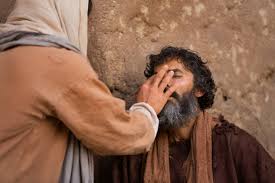HOMILY WEEK 06 03
Faith that Transforms; A Love that Heals
(Gen 8:6-22; Ps 116; Mk 8:22-26)
*******************************************
Have you ever participated in a trust walk?
The readings today invite us to place our complete trust in Jesus, experience his unconditional love, and become a new creation.
Youth ministers sometimes blindfold participants and have them follow the directions of a facilitator to impress on them the reality of trusting in God and another human being. Jesus does much the same thing in the gospel today with the blind man, a miracle that takes on deeper significance in the context of the story of Noah and the flood in the first reading.
Essentially, the two readings provide us with two contrasting images of God, of justice and how God wants to work in our lives now through the coming of Jesus as the Messiah into his own creation.
In the reading from Genesis, we glimpse a stern, punitive, exclusive and even violent God who decides to start creation over again by saving one family and exterminating all the others by means of a flood. This is a Hollywood ending – the good people win while the bad people are destroyed, or as the saying goes, “get their just deserts.” This whole scenario is called “retributive justice” today, and largely describes how our society and humanity as a whole operates on a daily basis, as well as the image many people project unto God, who is anything but that.
There is one fundamental problem with this approach which God actually admits even as God promises never again to “curse the ground” – and the problem is, nothing has really changed. Evil will continue on and on because as God puts it, “the inclination of the human heart is evil from youth.” That is the problem with retributive justice – deserved punishment is meted out, but hearts are not changed.
 There are other details in this story worth noting – the numbers 40 and 7, the raven, the dove and a freshly plucked olive branch. The number 40 is not meant to be taken literally – it symbolizes the time needed to bring something to fruition. The number 7 symbolizes newness, perfection. The raven flying back and forth until the waters dried the earth is a bit of a mystery, while the dove and olive branch can symbolize for us the Holy Spirit that hovered over the original chaos, and the new creation God is wanting to bring about through the flood.
There are other details in this story worth noting – the numbers 40 and 7, the raven, the dove and a freshly plucked olive branch. The number 40 is not meant to be taken literally – it symbolizes the time needed to bring something to fruition. The number 7 symbolizes newness, perfection. The raven flying back and forth until the waters dried the earth is a bit of a mystery, while the dove and olive branch can symbolize for us the Holy Spirit that hovered over the original chaos, and the new creation God is wanting to bring about through the flood.
Fast forward to the gospel which presents a totally different image of God in the person of Jesus Christ. First of all – there is inclusivity – a faith community is involved as “some people brought a man who was blind” to Jesus and beg Jesus to touch him. This brings to mind the friends of a paralytic who elsewhere in the gospels tear an opening in a roof to drop down the man right in front of Jesus.
 The response of Jesus to this negative (at that time sinful) state of blindness is telling. Jesus is the creator, the one through whom all things were made (Colossians 1:16). The creator of the universe took the blind man by the hand and led him on a trust walk out of the village, put saliva on his eyes, laid his hands on him, questioned him on his healing, and laid his hands on the man a second time. Imagine if that was you – what kind of impact that total focus and attention of Jesus and his love and caring on you would have. I think what healed many people was precisely that powerful, intense, singular attention of Jesus on a person, that overwhelming explosive jolt of pure love that is so rare in our world.
The response of Jesus to this negative (at that time sinful) state of blindness is telling. Jesus is the creator, the one through whom all things were made (Colossians 1:16). The creator of the universe took the blind man by the hand and led him on a trust walk out of the village, put saliva on his eyes, laid his hands on him, questioned him on his healing, and laid his hands on the man a second time. Imagine if that was you – what kind of impact that total focus and attention of Jesus and his love and caring on you would have. I think what healed many people was precisely that powerful, intense, singular attention of Jesus on a person, that overwhelming explosive jolt of pure love that is so rare in our world.
If the raven, dove and fig leaf were significant in the first reading, this incident teaches us the importance and power of sacramentals – in this case, touch, a question and even saliva. This is incarnational spirituality – the elements of creation being used to heal. We see here that “matter matters!” Holy water and blessed oil and salt take their value and power from the actions of Jesus, and we can be grateful for all of this. It all helps communicate God’s particular love for each one of us, and plays a role in our own healing.
This incident reveals a God who is mercy, humble, compassionate, forgiving, and who loves unconditionally. Our task is to believe in Jesus who personifies the love of God in our world, who makes it present. It is interesting that Jesus told the healed man after, “Do not even go into the village.” This is the messianic secret for Mark, when Jesus does miracles within Jewish territory. He knows the Jews were expecting a messiah who would be a political force to oust the hated Roman occupiers of Palestine, and that they would want to make him king, which was totally opposite to who he would prove to be – a crucified messiah, a merciful, forgiving God, whose only power would be the power of powerlessness, the power of attraction, the power of a helpless child, the power of unconditional love.
Jesus as the Messiah had a two-fold mission – to redeem and to sanctify, to forgive and to heal. Trusting in him, we can come to him to forgive all our sins, and more, to heal us of our sinfulness, that which makes sin. These defects are our painful emotions like anger and bitterness, our negative attitudes like false pride, selfishness, stubborn self-righteousness, lust, etc. How Jesus does that is by filling us with his love and with the gifts of the Holy Spirit. That powerful love heals and transforms us by pushing out all our negativity.
St. Therese of Lisieux had it right when she claimed God punishes us by loving us even more. The more we have sinned, the more we are forgiven, the more love we receive. And the more we have been hurt, the more we forgive, the more love we show. We can’t lose with God, who turns everything to the good for those who love him.
The sacrament of reconciliation is perhaps the favored place to receive and experience that awesome, unconditional love of God as forgiveness and healing. There is a powerful grace in celebrating that sacrament that breaks the power of sin over us, and fills us with the peace and joy only Jesus can give.

Tantoo Cardinal
Tantoo Cardinal can serve as an example for us of our need to experience the tangible love of God. Watching three actors (including Paul Newman) act out a scene, she was struck by the intensity of their words and actions. They were, in her words, giving all of themselves to the others, so much so that it all became real for her and was no longer acting. She also notes how one director drew out of her the character she was playing so forcefully that character became real for her, so tangible and tactile, she felt she was that character. That is what Jesus does for us – make God’s love for us real, tangible, tactile and even transformative.
The psalm offers us a wonderful way to respond to how bountiful our God is to us – to raise a cup of salvation, call on the name of the Lord and offer a sacrifice of praise – precisely what we do as we celebrate the Eucharist. May our celebration strengthen our trust in Jesus, deepen our experience of God’s unconditional love, and transform us into greater and greater Christlikeness.




If we want to be closer to God and let go of the past and all negative thoughts by going through reconcilation . We must admitt our wrong doings , faults and any sins to be forgiven and be healed. We ask God to forgive all our sins by doing penance and he will bless us by asking us to say certain prayers. We are to do repentance by changing ourselves by learning to do good things. We want to be healed we should put our lives in Jesus’ hands; trust him that he will resolve any problems we have like healing a blind and any type of sickness . So, we can enjoy this new creation by deepening our experience in God’s unconditional love, forgiveness and compassion so we can be Christlikeness. Jesus will be with us forever till the end . Amen. Amen.
Thanks for all the beautiful speech and messages about tbeing transformative faith to be closer to Jesus . I agree with the writings and teachings mentioned these days. When will someone see the works of God, know how he forgive us even though we are all sinners. The Jews do not believe he is the Messiah ; some one who can save them from sins and misery. They are still waiting for the King who is a life saviour. Amen. Gracias! Bishop Sylvain Lavoie